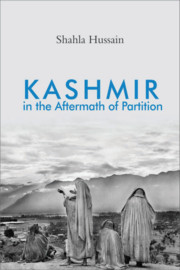Book contents
- Frontmatter
- Dedication
- Contents
- Acknowledgments
- Introduction
- 1 Meanings of Freedom in the Princely State of Jammu and Kashmir
- 2 Freedom, Loyalty, Belonging: Kashmir after Decolonization
- 3 Puppet Regimes: Collaboration and the Political Economy of Kashmiri Resistance
- 4 The Idea of Plebiscite: Discontent and Regional Dissidence
- 5 Mapping Kashmiri Imaginings of Freedom in the Inter-regional and Global Arenas
- 6 Jang-i-Aazadi (War for Freedom): Religion, Politics, and Resistance
- Conclusion
- Select Bibliography
- Index
5 - Mapping Kashmiri Imaginings of Freedom in the Inter-regional and Global Arenas
Published online by Cambridge University Press: 15 January 2021
- Frontmatter
- Dedication
- Contents
- Acknowledgments
- Introduction
- 1 Meanings of Freedom in the Princely State of Jammu and Kashmir
- 2 Freedom, Loyalty, Belonging: Kashmir after Decolonization
- 3 Puppet Regimes: Collaboration and the Political Economy of Kashmiri Resistance
- 4 The Idea of Plebiscite: Discontent and Regional Dissidence
- 5 Mapping Kashmiri Imaginings of Freedom in the Inter-regional and Global Arenas
- 6 Jang-i-Aazadi (War for Freedom): Religion, Politics, and Resistance
- Conclusion
- Select Bibliography
- Index
Summary
Many do not know where you are buried
There is no news, there is no grave
But for the millions you inspired
You live in their hearts and minds
Written by M. Yameen, these verses capture Kashmiris’ emotions about their most prominent voice of resistance during the 1960s, 1970s, and 1980s, Maqbool Butt (1938–84). Branded a “traitor” by the Indian state and labeled a “double agent” by the Pakistani military establishment, both of whom saw him as a citizen of one or the other nation-state, Butt cuts a complex figure in the subcontinent's postcolonial history. This chapter attends to these interpretations, but argues that to see Butt as a potential traitor to either nation-state was to miss his basic political point. Throughout Kashmir's postcolonial history, as I have recounted, Kashmiri Muslims transgressed the ceasefire line for social, economic, and political interactions, even though both India and Pakistan considered the flow across this “border” as unauthorized and illegal. Butt and his fellow resistance members openly rather than covertly challenged the hegemony of India and Pakistan by refusing to accept the ceasefire line as a permanent border, seeing it as an aberration. For them, “freedom” meant not the option to choose India or Pakistan in a plebiscite they had little evidence would ever occur, but rather the reunification of the entire historical territory of the state of Jammu and Kashmir and thus the healing of the social, economic, and political wound caused by the illegitimate ceasefire line. Butt's actions were directed against India and Pakistan only incidentally; they were undertaken rather in pursuit of his nationalist vision of a free Kashmir.
While much of the rest of this book focuses on events in India-administered Kashmir, especially in the Valley, this chapter concentrates on two other key spaces where a postcolonial Kashmiri nationalist identity developed and where new ideas about what freedom would look like, and how best to obtain it, were propagated:
Pakistan-administered Kashmir, and the transnational spaces, especially in the industrial cities of Great Britain, where exiles, expatriates, and refugees both debated events in their homeland and attempted to exert influence on them.
- Type
- Chapter
- Information
- Kashmir in the Aftermath of Partition , pp. 238 - 291Publisher: Cambridge University PressPrint publication year: 2021



